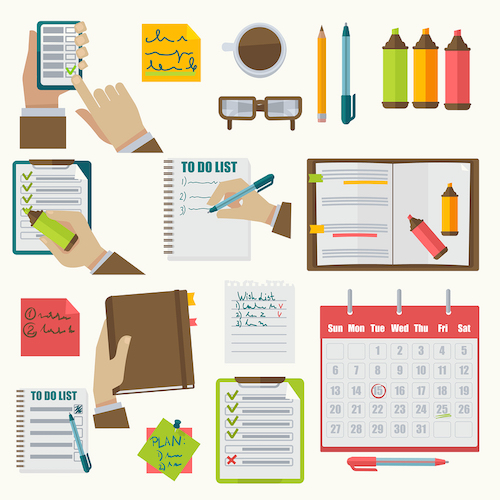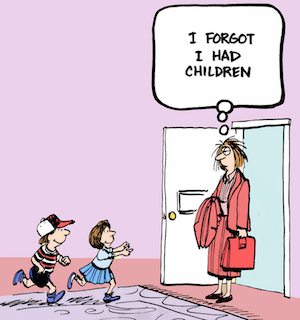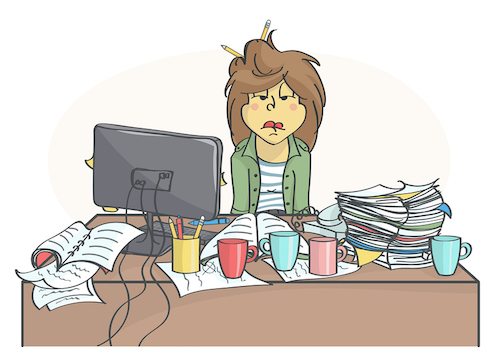6 Work Habits We Can Learn from Students
Roxanna Elden’s Disillusionment Power Pack – a month’s worth of friendly email insights – has helped hundreds of novice teachers get more centered in their first year of teaching. She shares a sample of that free advice here!
We’re always talking to students about study habits, but sometimes teachers need better methods for managing our own daily responsibilities.
Good news! Embedded in some of the very lectures we give to our students are tips that can work for us, too. I share this advice with lots of new teachers, but we could all probably use a good scold.
“Organize your stuff.”
When students don’t have specific places to store their notes and homework, they end up haphazardly shoveling papers into their backpacks, never to be seen again. This drives us crazy. Yet we’re making the same mistake when we let the inboxes on our desks fill up with things that should go elsewhere.
Teachers need filing systems for the various types of papers that land on our desks. As a quick reference, you should
(a) have a place to put student work you plan to grade (and a separate file for work you plan to collect but not grade);
(b) set up folders for papers you don’t need daily but still need to keep track of, and
(c) start an “ideas for later” box for potentially great flashes of insight that you simply don’t have time to look at until summer vacation.
“Don’t wait until the last minute.”
We get frustrated with students who wait until the night – or the lunch period – before a due date to work on major assignments. Teachers, too, need to set up routines for things that are important to keep up with, so we don’t wait until they’re suddenly urgent to get them started.
This includes parent contact, work toward your teaching certificate, and of course, grading the student work in those files you’ve set up. Otherwise, “Report Cards Eve” can feel a whole lot like your students feel when final projects are due – and unlike students, we can’t bring in a note about how our printers broke.
“Keep track of important dates (preferably all in one place).”
We know students shouldn’t keep track of assignments by writing on their hands or tiny scraps of loose paper – and we tell them so. Likewise, teachers set ourselves up for trouble when we try to juggle a desk calendar, a daily inspiration peel-off calendar, the lesson-plan-book calendar, that wall calendar by the desk, and the somewhat puzzling smartphone calendar – supplemented by the multiple handouts with testing and meeting dates that we forgot to write down anywhere.

“No, this is not group work.”
Teachers know that student group work can involve a whole lot of group, and not much work. Again, we’re usually not much better. Collaborative planning sessions often become disorganized meetings or chat fests that involve neither collaborating nor planning.
Grading papers with teacher friends also backfires much of the time – especially if you feel the need to compare notes or read your worst (or funniest) wrong answers out loud. Next time the idea of a paper-grading happy hour starts to sound tempting, remember: much of our work is best done with our eyes on our own paper.
“Stop playing with your phone!”
We know we need to limit distractions if we want students to stay on task. The same is true for us. There are some things that you will only do if you can separate yourself from anything even remotely fun – or even (suddenly) righteous. This explains why bringing home a bag full of essays suddenly motivates us to clean our entire house. For sure, if you’re on Facebook, those essays don’t stand a chance.
“Finish up at school and you’ll have less homework.”

Can you assign some jobs to student helpers? Can you grade a few papers or give feedback on the spot while students work? If you do decide to take work home, be realistic about how much time you will have to work on it. Then plan accordingly.
Students who are always promising to work harder aren’t necessarily the best students. Likewise, towing home a rolling crate filled with a supernatural workload doesn’t make you a better teacher, just exhausted or riddled with guilt.
For both students and teachers, the main point is to come to class prepared. When we do, those lectures we give the kids will ring with a lot more moral authority!
See all of Roxanna’s tips for new teachers
_______________________
Roxanna Elden is an NBCT and the author of See Me After Class: Advice for Teachers by Teachers. She is also the creator of the “Disillusionment Power Pack,” a free, one-month series of emails for new teachers in which she shares journal pages, stories, and insights she would have shared with the first-year teacher version of herself. Emails begin with signup and arrive every few days for one month.






































Good ideas. We definitely need to practice what we preach/teach!